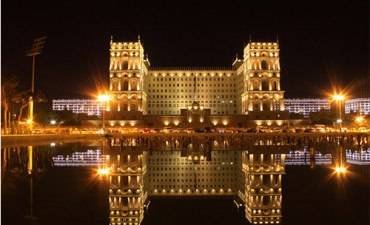Novruz Bayram
As the world awakens from its winter slumber, Azerbaijan bursts into life with the vibrant hues and joyous festivities of Novruz Bayram. Originally, it was a religious holiday predating the introduction of Islam in Azerbaijan, but nowadays, people of all faiths come together to celebrate it with immense joy.
The word "Novruz" is derived from the Persian words "now" meaning new and "ruz" meaning day, symbolizing the arrival of spring, the triumph of light over darkness, the awakening of nature after a long and cold winter, with its blooming flowers and the gradual melting of snow. This festive occasion spans three days, falling on the 20th, 21st, and 22nd of March, and it holds a special place in Azerbaijani culture. Steeped in rich traditions and symbolism, Novruz Bayram is not just a celebration; it is a cultural tapestry woven with the threads of history, faith, and community.
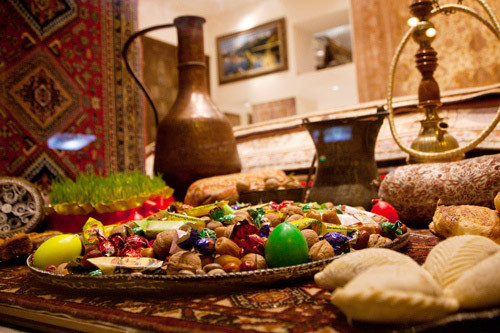
The Essence of the Celebration
At its core, Novruz Bayram embodies the universal themes of rebirth, rejuvenation, and hope. It is a time for shedding the old and embracing the new, for forgiving and seeking forgiveness, and for reconnecting with loved ones and the natural world. The holiday's significance transcends religious and ethnic boundaries, uniting people of all backgrounds in a shared celebration of life's renewal.
Traditions and Customs: A Glimpse into Azerbaijani Culture
The preparations for Novruz Bayram begin weeks in advance, with families diligently cleaning their homes and preparing a symbolic table known as "khoncha.", which features seven dishes, each starting with the letter "s," representing seven essential elements: health, wealth, wisdom, beauty, abundance, fertility, and kindness. Azerbaijani households engage in the delightful tradition of baking a variety of traditional sweets, including shekerbura, pahlava, gogal, and more. These treats may appear challenging to make, but Azerbaijani women craft them with remarkable skill and seemingly effortless grace.
One of the essential customs during Novruz Bayram is the thorough cleaning of one's home, people open their windows to let in the revitalizing spring air, welcoming the new season.
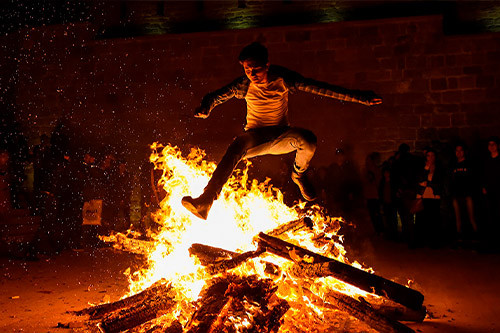
Another cherished tradition is the jumping of bonfires, believe to cleanse negativity and bring good fortune. The flickering flames illuminate the night sky as people gather around, symbolically leaving behind their troubles and embracing the promise of a brighter future. During this festive time, children frolic in the yards and streets, engaging in playful activities like participating in the "throwing hats" tradition, where hats are left at others' homes, an invitation for them to place candies inside for the kids. Meanwhile, adults, both men and women, busy themselves with household chores and preparing a special family dinner, showcasing the warmth and togetherness of the occasion, symbolizing a fresh start and the casting away of unnecessary possessions.
Novruz Bayram is not only about home and family; it's also a time for social connections. People take the opportunity to visit friends and invite them over, catching up and relishing the joy of spending quality time with loved ones. This celebration is a harmonious blend of cultural traditions, nature's rebirth, and cherished moments shared with friends and family. The spirit of celebration extends beyond homes and into the streets, where colorful parades, traditional music, and folk dances fill the air with joy and celebration. Children engage in playful games, while elders share stories and wisdom, passing down the rich cultural heritage to the next generation.
Novruz Bayram: A Celebration that Endures
Despite the passage of time and the ever-changing world around it, Novruz Bayram remains an integral part of Azerbaijani identity. It is a celebration that has weathered the storms of history, adapting and evolving while preserving its core essence.
In a world grappling with uncertainty and division, Novruz Bayram stands as a beacon of hope and unity. It reminds us of our interconnectedness with nature and the cyclical rhythms of life, emphasizing the importance of renewal, forgiveness, and compassion.
It is not only a celebration of nature but also a reflection of cultural heritage, fostering a sense of community and shared identity among those who observe the festival. The customs and traditions associated with Novruz vary among different cultures and regions, but the underlying theme of renewal and hope for the future remains constant.
Tags: Baku , Azerbaijan , Land of Fire , Fire Worshippers
Recent Posts
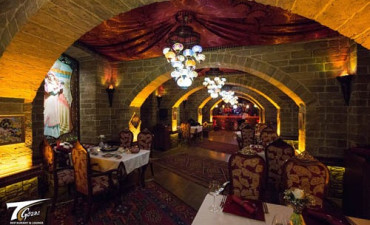
Buy any tour and get 15 percent discount in Baku restaurants
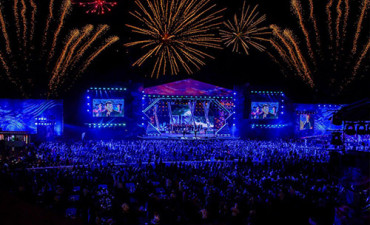
Festivals In Azerbaijan

Great Silk Road In Azerbaijan

Guide to outdoor activities
